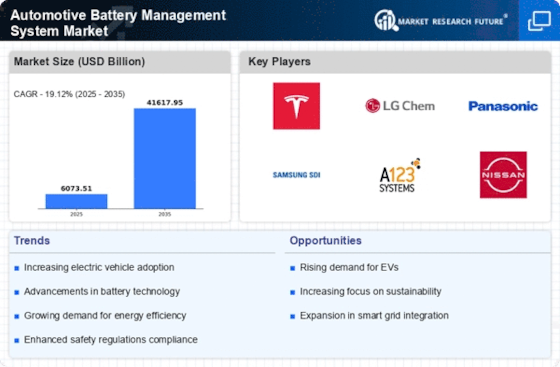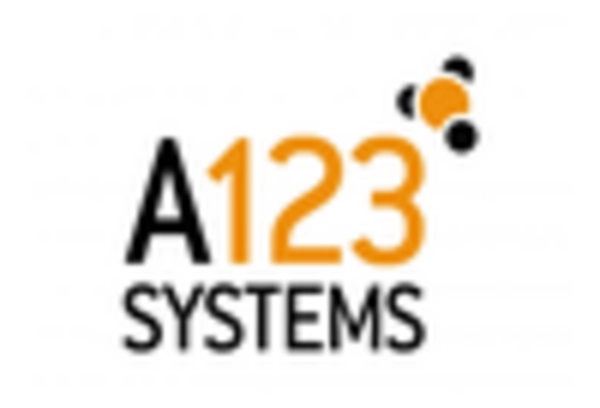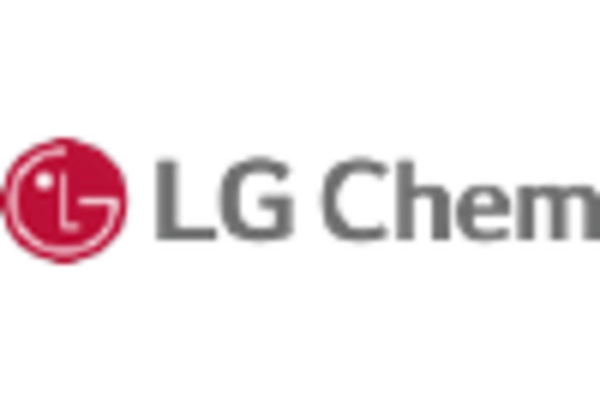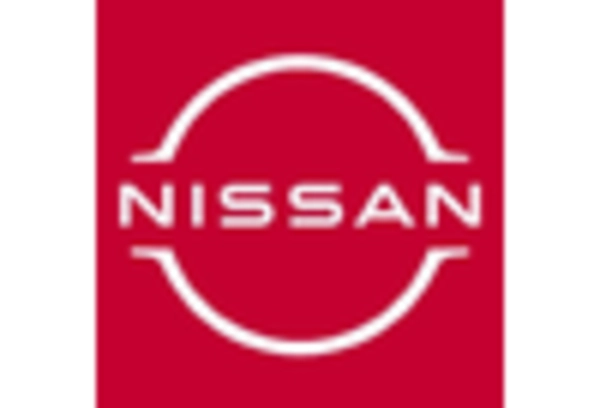Lithium-Ion Battery Management System
Lead-Acid Battery Management System
Nickel-Metal Hydride Battery Management System
Solid-State Battery Management System
Electric Vehicles
Hybrid Vehicles
Start-Stop Systems
Elevated Cycling Applications
Passenger Vehicles
Commercial Vehicles
Two Wheelers
Heavy-Duty Trucks
Battery Cells
Battery Modules
Battery Packs
Battery Maintenance
North America
Europe
South America
Asia Pacific
Middle East and Africa
North America Outlook (USD Billion, 2019-2035)
North America Automotive Battery Management System Market by Technology Type
Lithium-Ion Battery Management System
Lead-Acid Battery Management System
Nickel-Metal Hydride Battery Management System
Solid-State Battery Management System
North America Automotive Battery Management System Market by Application Type
Electric Vehicles
Hybrid Vehicles
Start-Stop Systems
Elevated Cycling Applications
North America Automotive Battery Management System Market by End Use Type
Passenger Vehicles
Commercial Vehicles
Two Wheelers
Heavy-Duty Trucks
North America Automotive Battery Management System Market by Component Type
Battery Cells
Battery Modules
Battery Packs
Battery Maintenance
North America Automotive Battery Management System Market by Regional Type
US
Canada
US Outlook (USD Billion, 2019-2035)
US Automotive Battery Management System Market by Technology Type
Lithium-Ion Battery Management System
Lead-Acid Battery Management System
Nickel-Metal Hydride Battery Management System
Solid-State Battery Management System
US Automotive Battery Management System Market by Application Type
Electric Vehicles
Hybrid Vehicles
Start-Stop Systems
Elevated Cycling Applications
US Automotive Battery Management System Market by End Use Type
Passenger Vehicles
Commercial Vehicles
Two Wheelers
Heavy-Duty Trucks
US Automotive Battery Management System Market by Component Type
Battery Cells
Battery Modules
Battery Packs
Battery Maintenance
CANADA Outlook (USD Billion, 2019-2035)
CANADA Automotive Battery Management System Market by Technology Type
Lithium-Ion Battery Management System
Lead-Acid Battery Management System
Nickel-Metal Hydride Battery Management System
Solid-State Battery Management System
CANADA Automotive Battery Management System Market by Application Type
Electric Vehicles
Hybrid Vehicles
Start-Stop Systems
Elevated Cycling Applications
CANADA Automotive Battery Management System Market by End Use Type
Passenger Vehicles
Commercial Vehicles
Two Wheelers
Heavy-Duty Trucks
CANADA Automotive Battery Management System Market by Component Type
Battery Cells
Battery Modules
Battery Packs
Battery Maintenance
Europe Outlook (USD Billion, 2019-2035)
Europe Automotive Battery Management System Market by Technology Type
Lithium-Ion Battery Management System
Lead-Acid Battery Management System
Nickel-Metal Hydride Battery Management System
Solid-State Battery Management System
Europe Automotive Battery Management System Market by Application Type
Electric Vehicles
Hybrid Vehicles
Start-Stop Systems
Elevated Cycling Applications
Europe Automotive Battery Management System Market by End Use Type
Passenger Vehicles
Commercial Vehicles
Two Wheelers
Heavy-Duty Trucks
Europe Automotive Battery Management System Market by Component Type
Battery Cells
Battery Modules
Battery Packs
Battery Maintenance
Europe Automotive Battery Management System Market by Regional Type
Germany
UK
France
Russia
Italy
Spain
Rest of Europe
GERMANY Outlook (USD Billion, 2019-2035)
GERMANY Automotive Battery Management System Market by Technology Type
Lithium-Ion Battery Management System
Lead-Acid Battery Management System
Nickel-Metal Hydride Battery Management System
Solid-State Battery Management System
GERMANY Automotive Battery Management System Market by Application Type
Electric Vehicles
Hybrid Vehicles
Start-Stop Systems
Elevated Cycling Applications
GERMANY Automotive Battery Management System Market by End Use Type
Passenger Vehicles
Commercial Vehicles
Two Wheelers
Heavy-Duty Trucks
GERMANY Automotive Battery Management System Market by Component Type
Battery Cells
Battery Modules
Battery Packs
Battery Maintenance
UK Outlook (USD Billion, 2019-2035)
UK Automotive Battery Management System Market by Technology Type
Lithium-Ion Battery Management System
Lead-Acid Battery Management System
Nickel-Metal Hydride Battery Management System
Solid-State Battery Management System
UK Automotive Battery Management System Market by Application Type
Electric Vehicles
Hybrid Vehicles
Start-Stop Systems
Elevated Cycling Applications
UK Automotive Battery Management System Market by End Use Type
Passenger Vehicles
Commercial Vehicles
Two Wheelers
Heavy-Duty Trucks
UK Automotive Battery Management System Market by Component Type
Battery Cells
Battery Modules
Battery Packs
Battery Maintenance
FRANCE Outlook (USD Billion, 2019-2035)
FRANCE Automotive Battery Management System Market by Technology Type
Lithium-Ion Battery Management System
Lead-Acid Battery Management System
Nickel-Metal Hydride Battery Management System
Solid-State Battery Management System
FRANCE Automotive Battery Management System Market by Application Type
Electric Vehicles
Hybrid Vehicles
Start-Stop Systems
Elevated Cycling Applications
FRANCE Automotive Battery Management System Market by End Use Type
Passenger Vehicles
Commercial Vehicles
Two Wheelers
Heavy-Duty Trucks
FRANCE Automotive Battery Management System Market by Component Type
Battery Cells
Battery Modules
Battery Packs
Battery Maintenance
RUSSIA Outlook (USD Billion, 2019-2035)
RUSSIA Automotive Battery Management System Market by Technology Type
Lithium-Ion Battery Management System
Lead-Acid Battery Management System
Nickel-Metal Hydride Battery Management System
Solid-State Battery Management System
RUSSIA Automotive Battery Management System Market by Application Type
Electric Vehicles
Hybrid Vehicles
Start-Stop Systems
Elevated Cycling Applications
RUSSIA Automotive Battery Management System Market by End Use Type
Passenger Vehicles
Commercial Vehicles
Two Wheelers
Heavy-Duty Trucks
RUSSIA Automotive Battery Management System Market by Component Type
Battery Cells
Battery Modules
Battery Packs
Battery Maintenance
ITALY Outlook (USD Billion, 2019-2035)
ITALY Automotive Battery Management System Market by Technology Type
Lithium-Ion Battery Management System
Lead-Acid Battery Management System
Nickel-Metal Hydride Battery Management System
Solid-State Battery Management System
ITALY Automotive Battery Management System Market by Application Type
Electric Vehicles
Hybrid Vehicles
Start-Stop Systems
Elevated Cycling Applications
ITALY Automotive Battery Management System Market by End Use Type
Passenger Vehicles
Commercial Vehicles
Two Wheelers
Heavy-Duty Trucks
ITALY Automotive Battery Management System Market by Component Type
Battery Cells
Battery Modules
Battery Packs
Battery Maintenance
SPAIN Outlook (USD Billion, 2019-2035)
SPAIN Automotive Battery Management System Market by Technology Type
Lithium-Ion Battery Management System
Lead-Acid Battery Management System
Nickel-Metal Hydride Battery Management System
Solid-State Battery Management System
SPAIN Automotive Battery Management System Market by Application Type
Electric Vehicles
Hybrid Vehicles
Start-Stop Systems
Elevated Cycling Applications
SPAIN Automotive Battery Management System Market by End Use Type
Passenger Vehicles
Commercial Vehicles
Two Wheelers
Heavy-Duty Trucks
SPAIN Automotive Battery Management System Market by Component Type
Battery Cells
Battery Modules
Battery Packs
Battery Maintenance
REST OF EUROPE Outlook (USD Billion, 2019-2035)
REST OF EUROPE Automotive Battery Management System Market by Technology Type
Lithium-Ion Battery Management System
Lead-Acid Battery Management System
Nickel-Metal Hydride Battery Management System
Solid-State Battery Management System
REST OF EUROPE Automotive Battery Management System Market by Application Type
Electric Vehicles
Hybrid Vehicles
Start-Stop Systems
Elevated Cycling Applications
REST OF EUROPE Automotive Battery Management System Market by End Use Type
Passenger Vehicles
Commercial Vehicles
Two Wheelers
Heavy-Duty Trucks
REST OF EUROPE Automotive Battery Management System Market by Component Type
Battery Cells
Battery Modules
Battery Packs
Battery Maintenance
APAC Outlook (USD Billion, 2019-2035)
APAC Automotive Battery Management System Market by Technology Type
Lithium-Ion Battery Management System
Lead-Acid Battery Management System
Nickel-Metal Hydride Battery Management System
Solid-State Battery Management System
APAC Automotive Battery Management System Market by Application Type
Electric Vehicles
Hybrid Vehicles
Start-Stop Systems
Elevated Cycling Applications
APAC Automotive Battery Management System Market by End Use Type
Passenger Vehicles
Commercial Vehicles
Two Wheelers
Heavy-Duty Trucks
APAC Automotive Battery Management System Market by Component Type
Battery Cells
Battery Modules
Battery Packs
Battery Maintenance
APAC Automotive Battery Management System Market by Regional Type
China
India
Japan
South Korea
Malaysia
Thailand
Indonesia
Rest of APAC
CHINA Outlook (USD Billion, 2019-2035)
CHINA Automotive Battery Management System Market by Technology Type
Lithium-Ion Battery Management System
Lead-Acid Battery Management System
Nickel-Metal Hydride Battery Management System
Solid-State Battery Management System
CHINA Automotive Battery Management System Market by Application Type
Electric Vehicles
Hybrid Vehicles
Start-Stop Systems
Elevated Cycling Applications
CHINA Automotive Battery Management System Market by End Use Type
Passenger Vehicles
Commercial Vehicles
Two Wheelers
Heavy-Duty Trucks
CHINA Automotive Battery Management System Market by Component Type
Battery Cells
Battery Modules
Battery Packs
Battery Maintenance
INDIA Outlook (USD Billion, 2019-2035)
INDIA Automotive Battery Management System Market by Technology Type
Lithium-Ion Battery Management System
Lead-Acid Battery Management System
Nickel-Metal Hydride Battery Management System
Solid-State Battery Management System
INDIA Automotive Battery Management System Market by Application Type
Electric Vehicles
Hybrid Vehicles
Start-Stop Systems
Elevated Cycling Applications
INDIA Automotive Battery Management System Market by End Use Type
Passenger Vehicles
Commercial Vehicles
Two Wheelers
Heavy-Duty Trucks
INDIA Automotive Battery Management System Market by Component Type
Battery Cells
Battery Modules
Battery Packs
Battery Maintenance
JAPAN Outlook (USD Billion, 2019-2035)
JAPAN Automotive Battery Management System Market by Technology Type
Lithium-Ion Battery Management System
Lead-Acid Battery Management System
Nickel-Metal Hydride Battery Management System
Solid-State Battery Management System
JAPAN Automotive Battery Management System Market by Application Type
Electric Vehicles
Hybrid Vehicles
Start-Stop Systems
Elevated Cycling Applications
JAPAN Automotive Battery Management System Market by End Use Type
Passenger Vehicles
Commercial Vehicles
Two Wheelers
Heavy-Duty Trucks
JAPAN Automotive Battery Management System Market by Component Type
Battery Cells
Battery Modules
Battery Packs
Battery Maintenance
SOUTH KOREA Outlook (USD Billion, 2019-2035)
SOUTH KOREA Automotive Battery Management System Market by Technology Type
Lithium-Ion Battery Management System
Lead-Acid Battery Management System
Nickel-Metal Hydride Battery Management System
Solid-State Battery Management System
SOUTH KOREA Automotive Battery Management System Market by Application Type
Electric Vehicles
Hybrid Vehicles
Start-Stop Systems
Elevated Cycling Applications
SOUTH KOREA Automotive Battery Management System Market by End Use Type
Passenger Vehicles
Commercial Vehicles
Two Wheelers
Heavy-Duty Trucks
SOUTH KOREA Automotive Battery Management System Market by Component Type
Battery Cells
Battery Modules
Battery Packs
Battery Maintenance
MALAYSIA Outlook (USD Billion, 2019-2035)
MALAYSIA Automotive Battery Management System Market by Technology Type
Lithium-Ion Battery Management System
Lead-Acid Battery Management System
Nickel-Metal Hydride Battery Management System
Solid-State Battery Management System
MALAYSIA Automotive Battery Management System Market by Application Type
Electric Vehicles
Hybrid Vehicles
Start-Stop Systems
Elevated Cycling Applications
MALAYSIA Automotive Battery Management System Market by End Use Type
Passenger Vehicles
Commercial Vehicles
Two Wheelers
Heavy-Duty Trucks
MALAYSIA Automotive Battery Management System Market by Component Type
Battery Cells
Battery Modules
Battery Packs
Battery Maintenance
THAILAND Outlook (USD Billion, 2019-2035)
THAILAND Automotive Battery Management System Market by Technology Type
Lithium-Ion Battery Management System
Lead-Acid Battery Management System
Nickel-Metal Hydride Battery Management System
Solid-State Battery Management System
THAILAND Automotive Battery Management System Market by Application Type
Electric Vehicles
Hybrid Vehicles
Start-Stop Systems
Elevated Cycling Applications
THAILAND Automotive Battery Management System Market by End Use Type
Passenger Vehicles
Commercial Vehicles
Two Wheelers
Heavy-Duty Trucks
THAILAND Automotive Battery Management System Market by Component Type
Battery Cells
Battery Modules
Battery Packs
Battery Maintenance
INDONESIA Outlook (USD Billion, 2019-2035)
INDONESIA Automotive Battery Management System Market by Technology Type
Lithium-Ion Battery Management System
Lead-Acid Battery Management System
Nickel-Metal Hydride Battery Management System
Solid-State Battery Management System
INDONESIA Automotive Battery Management System Market by Application Type
Electric Vehicles
Hybrid Vehicles
Start-Stop Systems
Elevated Cycling Applications
INDONESIA Automotive Battery Management System Market by End Use Type
Passenger Vehicles
Commercial Vehicles
Two Wheelers
Heavy-Duty Trucks
INDONESIA Automotive Battery Management System Market by Component Type
Battery Cells
Battery Modules
Battery Packs
Battery Maintenance
REST OF APAC Outlook (USD Billion, 2019-2035)
REST OF APAC Automotive Battery Management System Market by Technology Type
Lithium-Ion Battery Management System
Lead-Acid Battery Management System
Nickel-Metal Hydride Battery Management System
Solid-State Battery Management System
REST OF APAC Automotive Battery Management System Market by Application Type
Electric Vehicles
Hybrid Vehicles
Start-Stop Systems
Elevated Cycling Applications
REST OF APAC Automotive Battery Management System Market by End Use Type
Passenger Vehicles
Commercial Vehicles
Two Wheelers
Heavy-Duty Trucks
REST OF APAC Automotive Battery Management System Market by Component Type
Battery Cells
Battery Modules
Battery Packs
Battery Maintenance
South America Outlook (USD Billion, 2019-2035)
South America Automotive Battery Management System Market by Technology Type
Lithium-Ion Battery Management System
Lead-Acid Battery Management System
Nickel-Metal Hydride Battery Management System
Solid-State Battery Management System
South America Automotive Battery Management System Market by Application Type
Electric Vehicles
Hybrid Vehicles
Start-Stop Systems
Elevated Cycling Applications
South America Automotive Battery Management System Market by End Use Type
Passenger Vehicles
Commercial Vehicles
Two Wheelers
Heavy-Duty Trucks
South America Automotive Battery Management System Market by Component Type
Battery Cells
Battery Modules
Battery Packs
Battery Maintenance
South America Automotive Battery Management System Market by Regional Type
Brazil
Mexico
Argentina
Rest of South America
BRAZIL Outlook (USD Billion, 2019-2035)
BRAZIL Automotive Battery Management System Market by Technology Type
Lithium-Ion Battery Management System
Lead-Acid Battery Management System
Nickel-Metal Hydride Battery Management System
Solid-State Battery Management System
BRAZIL Automotive Battery Management System Market by Application Type
Electric Vehicles
Hybrid Vehicles
Start-Stop Systems
Elevated Cycling Applications
BRAZIL Automotive Battery Management System Market by End Use Type
Passenger Vehicles
Commercial Vehicles
Two Wheelers
Heavy-Duty Trucks
BRAZIL Automotive Battery Management System Market by Component Type
Battery Cells
Battery Modules
Battery Packs
Battery Maintenance
MEXICO Outlook (USD Billion, 2019-2035)
MEXICO Automotive Battery Management System Market by Technology Type
Lithium-Ion Battery Management System
Lead-Acid Battery Management System
Nickel-Metal Hydride Battery Management System
Solid-State Battery Management System
MEXICO Automotive Battery Management System Market by Application Type
Electric Vehicles
Hybrid Vehicles
Start-Stop Systems
Elevated Cycling Applications
MEXICO Automotive Battery Management System Market by End Use Type
Passenger Vehicles
Commercial Vehicles
Two Wheelers
Heavy-Duty Trucks
MEXICO Automotive Battery Management System Market by Component Type
Battery Cells
Battery Modules
Battery Packs
Battery Maintenance
ARGENTINA Outlook (USD Billion, 2019-2035)
ARGENTINA Automotive Battery Management System Market by Technology Type
Lithium-Ion Battery Management System
Lead-Acid Battery Management System
Nickel-Metal Hydride Battery Management System
Solid-State Battery Management System
ARGENTINA Automotive Battery Management System Market by Application Type
Electric Vehicles
Hybrid Vehicles
Start-Stop Systems
Elevated Cycling Applications
ARGENTINA Automotive Battery Management System Market by End Use Type
Passenger Vehicles
Commercial Vehicles
Two Wheelers
Heavy-Duty Trucks
ARGENTINA Automotive Battery Management System Market by Component Type
Battery Cells
Battery Modules
Battery Packs
Battery Maintenance
REST OF SOUTH AMERICA Outlook (USD Billion, 2019-2035)
REST OF SOUTH AMERICA Automotive Battery Management System Market by Technology Type
Lithium-Ion Battery Management System
Lead-Acid Battery Management System
Nickel-Metal Hydride Battery Management System
Solid-State Battery Management System
REST OF SOUTH AMERICA Automotive Battery Management System Market by Application Type
Electric Vehicles
Hybrid Vehicles
Start-Stop Systems
Elevated Cycling Applications
REST OF SOUTH AMERICA Automotive Battery Management System Market by End Use Type
Passenger Vehicles
Commercial Vehicles
Two Wheelers
Heavy-Duty Trucks
REST OF SOUTH AMERICA Automotive Battery Management System Market by Component Type
Battery Cells
Battery Modules
Battery Packs
Battery Maintenance
MEA Outlook (USD Billion, 2019-2035)
MEA Automotive Battery Management System Market by Technology Type
Lithium-Ion Battery Management System
Lead-Acid Battery Management System
Nickel-Metal Hydride Battery Management System
Solid-State Battery Management System
MEA Automotive Battery Management System Market by Application Type
Electric Vehicles
Hybrid Vehicles
Start-Stop Systems
Elevated Cycling Applications
MEA Automotive Battery Management System Market by End Use Type
Passenger Vehicles
Commercial Vehicles
Two Wheelers
Heavy-Duty Trucks
MEA Automotive Battery Management System Market by Component Type
Battery Cells
Battery Modules
Battery Packs
Battery Maintenance
MEA Automotive Battery Management System Market by Regional Type
GCC Countries
South Africa
Rest of MEA
GCC COUNTRIES Outlook (USD Billion, 2019-2035)
GCC COUNTRIES Automotive Battery Management System Market by Technology Type
Lithium-Ion Battery Management System
Lead-Acid Battery Management System
Nickel-Metal Hydride Battery Management System
Solid-State Battery Management System
GCC COUNTRIES Automotive Battery Management System Market by Application Type
Electric Vehicles
Hybrid Vehicles
Start-Stop Systems
Elevated Cycling Applications
GCC COUNTRIES Automotive Battery Management System Market by End Use Type
Passenger Vehicles
Commercial Vehicles
Two Wheelers
Heavy-Duty Trucks
GCC COUNTRIES Automotive Battery Management System Market by Component Type
Battery Cells
Battery Modules
Battery Packs
Battery Maintenance
SOUTH AFRICA Outlook (USD Billion, 2019-2035)
SOUTH AFRICA Automotive Battery Management System Market by Technology Type
Lithium-Ion Battery Management System
Lead-Acid Battery Management System
Nickel-Metal Hydride Battery Management System
Solid-State Battery Management System
SOUTH AFRICA Automotive Battery Management System Market by Application Type
Electric Vehicles
Hybrid Vehicles
Start-Stop Systems
Elevated Cycling Applications
SOUTH AFRICA Automotive Battery Management System Market by End Use Type
Passenger Vehicles
Commercial Vehicles
Two Wheelers
Heavy-Duty Trucks
SOUTH AFRICA Automotive Battery Management System Market by Component Type
Battery Cells
Battery Modules
Battery Packs
Battery Maintenance
REST OF MEA Outlook (USD Billion, 2019-2035)
REST OF MEA Automotive Battery Management System Market by Technology Type
Lithium-Ion Battery Management System
Lead-Acid Battery Management System
Nickel-Metal Hydride Battery Management System
Solid-State Battery Management System
REST OF MEA Automotive Battery Management System Market by Application Type
Electric Vehicles
Hybrid Vehicles
Start-Stop Systems
Elevated Cycling Applications
REST OF MEA Automotive Battery Management System Market by End Use Type
Passenger Vehicles
Commercial Vehicles
Two Wheelers
Heavy-Duty Trucks
REST OF MEA Automotive Battery Management System Market by Component Type
Battery Cells
Battery Modules
Battery Packs
Battery Maintenance


















Leave a Comment